
A website is the centerpiece of your brand’s online presence and growth. In a time when the digital landscape is far too competitive and attention spans are far too short, a website that just “works” won’t cut it. For your website to shine, it must represent your brand well, provide a great user experience, and appear high in search engine results. Let’s discuss how custom website design improves SEO and brand visibility. Custom website design covers SEO optimization, tailored functionality, and stunning visuals.
This isn’t just an investment in visual design; a custom website is your brand’s secret weapon for reaching wider audiences and building lasting relationships. In other words, a custom SEO friendly website design uses URL paths to work efficiently with search engines. It is also responsive, meaning it renders well on various screen sizes. Finally, it narrates the story of your brands, products, and people—all to ensure that your business is not simply online but well-seated as a trusted name in your industry.
This blog will discuss how a custom website design positively impacts your online presence through improved SEO, enhanced user experiences, and personalized brand identity in an ever-changing digital space.
A custom website design is a specific solution built to fulfill the exact needs of your business. While templated sites have reused layouts and functionality, custom designs allow for accurate adjustability and scalability. Everything is optimized, from visuals to backend code to help attain your business goals, reflect your brand personality, and meet audience preferences.
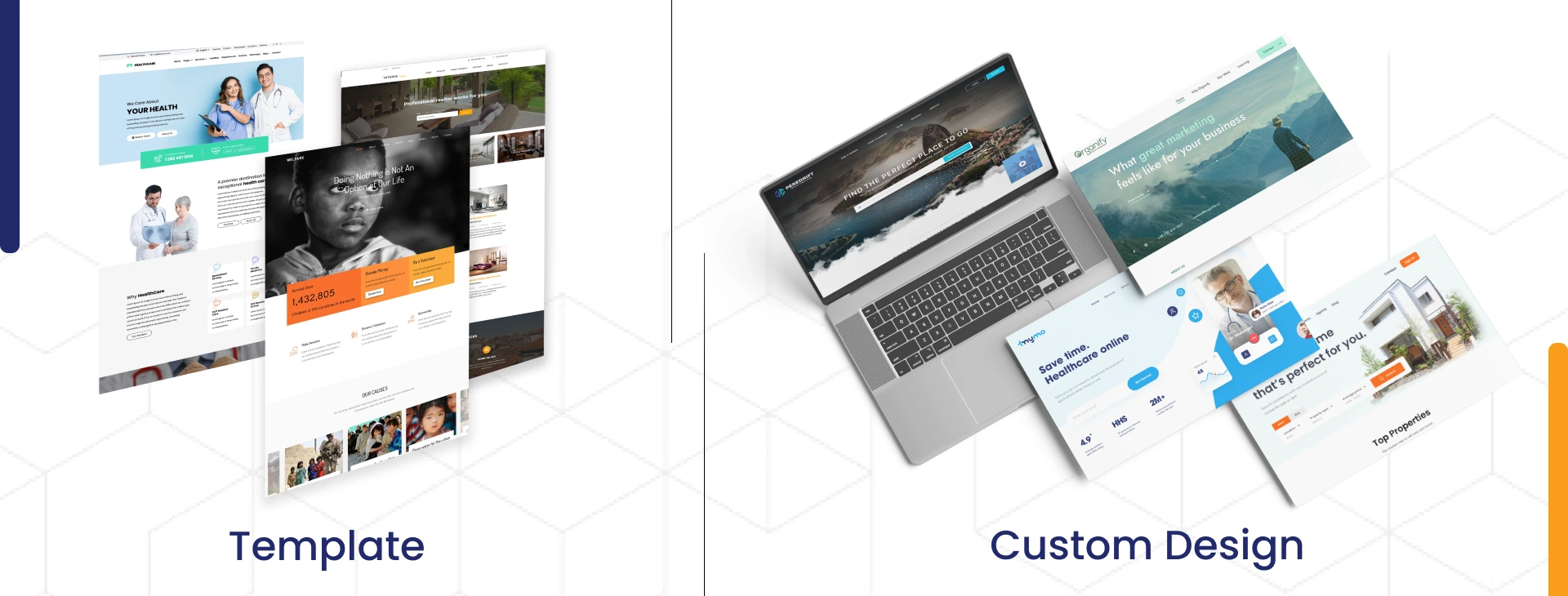
Custom website design enables businesses to incorporate features that cater to specific needs:
SEO is not a checklist; it is the foundation of online visibility. With an SEO friendly website design, businesses can start building this foundation from scratch. Well-structured, efficient coding enhances crawlability; on the other hand, optimized schema markup guarantees search engines develop an accurate comprehension of your content. Kindly link keywords to easy navigation, custom website design for SEO reinforces best practices naturally, ensuring that your site is primed for long-term success in search rankings.
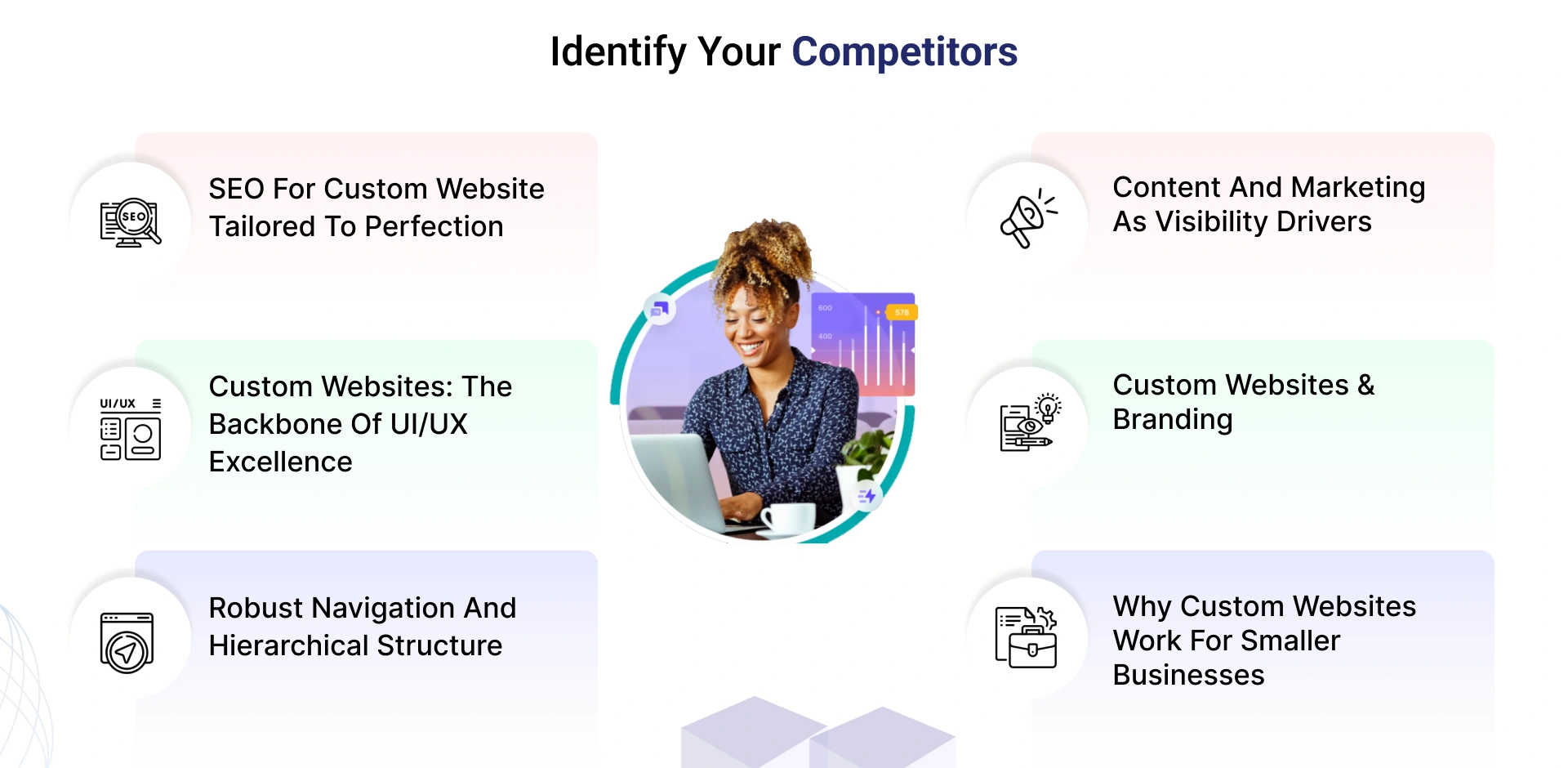
Your website’s UI is its first impression, and your user experience determines whether visitors stay or leave. SEO friendly website design have functionality as the highest priority. Advanced UI elements such as interactive visuals, animations, and personalized dashboards can be effortlessly incorporated to engage and retain users.
Take Greenhouse, a recruiting software company enhanced its website with personalized dashboards and an intuitive job application process. This led to a 60% improvement in applicant engagement.
A critical element of brand visibility is how well users navigate your website. A custom site allows for a well-planned page hierarchy, which improves the user experience and ensures search engines can crawl your content more effectively. Proper header tags, breadcrumbs, and internal linking make your site an SEO powerhouse while guiding visitors through a seamless journey.
For example, an eCommerce store could implement category pages that lead to subcategories and individual product pages, all optimized for specific keywords. This logical structure ensures users never feel lost while improving visibility for long-tail search queries as a part of a larger web design for SEO strategy.
A custom website makes it easier for your marketing and content teams to collaborate, ensuring your message reaches the right audience at the right time. Built-in analytics tools allow for performance tracking, enabling data-driven decisions to enhance campaigns. Custom integrations with platforms like Google Analytics or HubSpot can further refine your approach, ensuring every piece of content contributes to brand visibility.
Additionally, content presentation is elevated through custom layouts. Instead of relying on static templates, you can create visually engaging blog posts, case studies, or videos that align with your brand’s voice. This increases the time visitors spend on your site and improves SEO for custom website, driving more traffic over time.
A custom website doesn’t just display your brand—it becomes your brand. It’s a platform where innovation meets strategy, designed to enhance every facet of your business. With no limitations on design or functionality, you can build an online presence that’s as dynamic and unique as your company.
In today’s competitive digital landscape, brand visibility is paramount. A custom website ensures your brand isn’t just seen—it’s remembered. It’s where your audience experiences your story, engages with your values, and becomes loyal to your business.
Custom websites aren’t just for large enterprises—they can be particularly beneficial for smaller businesses by addressing specific challenges and leveraging unique opportunities:
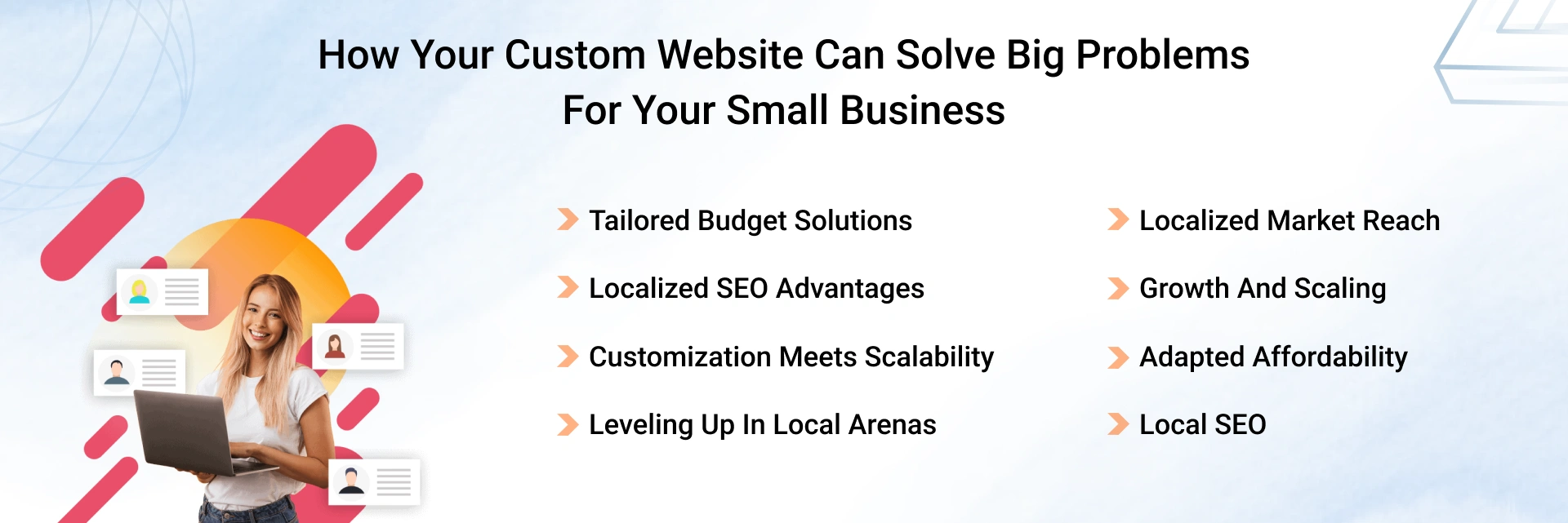
Many smaller businesses work with tiny marketing budgets. Highly customizable — As a business grows, its needs change and demand more features to match, with custom website developers having the freedom to pick which aspects to focus on for maximum effect and no wasted purchase. For example, they enable more streamlined functionalities, such as simplified navigation or single-page layouts that directly address the target audience’s requirements, thus keeping the costs within range.
Website design for SEO also facilitates localized marketing strategies; integrating this feature on your website, such as using location-based keywords, Google Maps embedding, adding region-specific landing pages, etc., can allow your customers to search for proper routes and reach you easily. This helps lift your website in local search results, which makes it easier for smaller businesses to attract proximate customers.
Unlike template-based websites, custom designs scale with your business. When your needs change, adding features, pages, or eCommerce functionality is very easy. Such adaptability is critical for SMEs looking to scale while retaining the integrity of their online presence.
For example, Blu Ridge Community College: This school can showcase its localized focus through a custom-designed website. This design presents a professional community-targeted look that serves the audience well and shows how a smaller non-profit can earn trust and engagement through catered design.
Custom websites enable smaller enterprises to shine even in the shadows of larger competitors by delivering bespoke, on-brand experiences that speak to local sensibilities. When combined with targeted content, they help smaller businesses become credible and trustworthy options in their communities.
Custom websites can include location-based SEO strategies, allowing smaller businesses to shine in local search results. This is especially helpful for businesses that want to attract customers nearby.
Custom websites can be modified or extended with new features, pages, or functions to keep up with business growth, making them relevant and operational.
Smaller websites can still access a premium coverage policy—carefully tailored without unnecessary extras—so they can focus their budget on what truly matters.
Yelp empowers smaller businesses to stand out in local search results by offering tools like location-specific business pages, customer reviews, and personalized content—helping them attract nearby customers and compete with larger brands in their area.
A custom website is more than just a digital storefront—it’s the centerpiece of your brand’s identity. While templates provide essential design elements, custom design offers complete control over your website's look, feel, and functionality. It’s about crafting a digital experience that reflects your brand's values and engages visitors meaningfully.
Custom websites empower businesses to build highly effective and targeted landing pages tailored for specific marketing campaigns—email marketing, social media promotions, or digital advertising. These pages are more than just standalone designs; they function as conversion powerhouses, bridging the gap between campaigns and customer engagement.
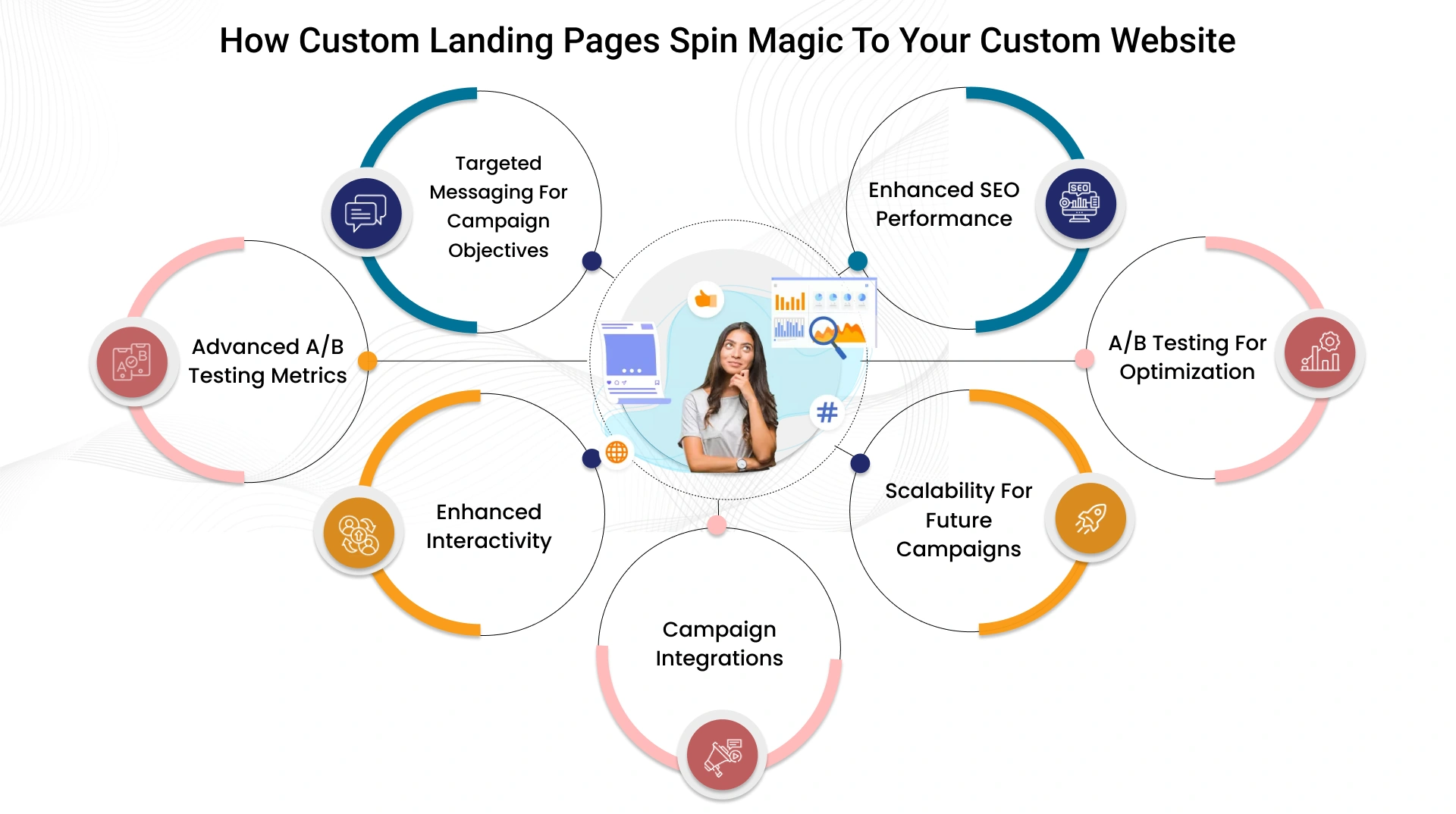
Why Custom Landing Pages Matter:
A custom landing page can plug into a more extensive marketing campaign. The pages serve a seamless experience that leads users through the conversion funnel, either with email campaigns or digital ads. for coupons — in email marketing, social media promotions, or advertising. These pages can:
Custom websites grow with your business. You can easily add new pages, features, or content without starting from scratch. These websites can:
A custom website brings all your marketing tools together—making it easier to manage campaigns and track results. These websites can:
A well-defined navigation framework allows the users to search for information quickly, reducing bounce rates and increasing dwell time. For example, well-designed menus, breadcrumbs, and search functionality help users find their content quickly and effectively.
Practical Strategies and Real-World Examples:
Case Study: Blu Ridge Community College: Similar to the site above, this navigation system displays how personalized user navigation strategies will successfully produce usable information for students, parents, and educators for small institutions.
These examples show how user-friendly navigation positively affects user satisfaction and brand visibility.
The technical side of your website is as essential to your SEO as the content itself. With a custom-built website, you can custom implement every - and I mean EVERY - technical aspect of your approach to SEO to improve how search engines crawl and index your website.
Custom website design and SEO go hand in hand to create a powerful online presence. Here’s how they work together to drive success. A well-optimized custom site enhances visibility and user experience. It ensures faster load times, better rankings, and improved engagement.
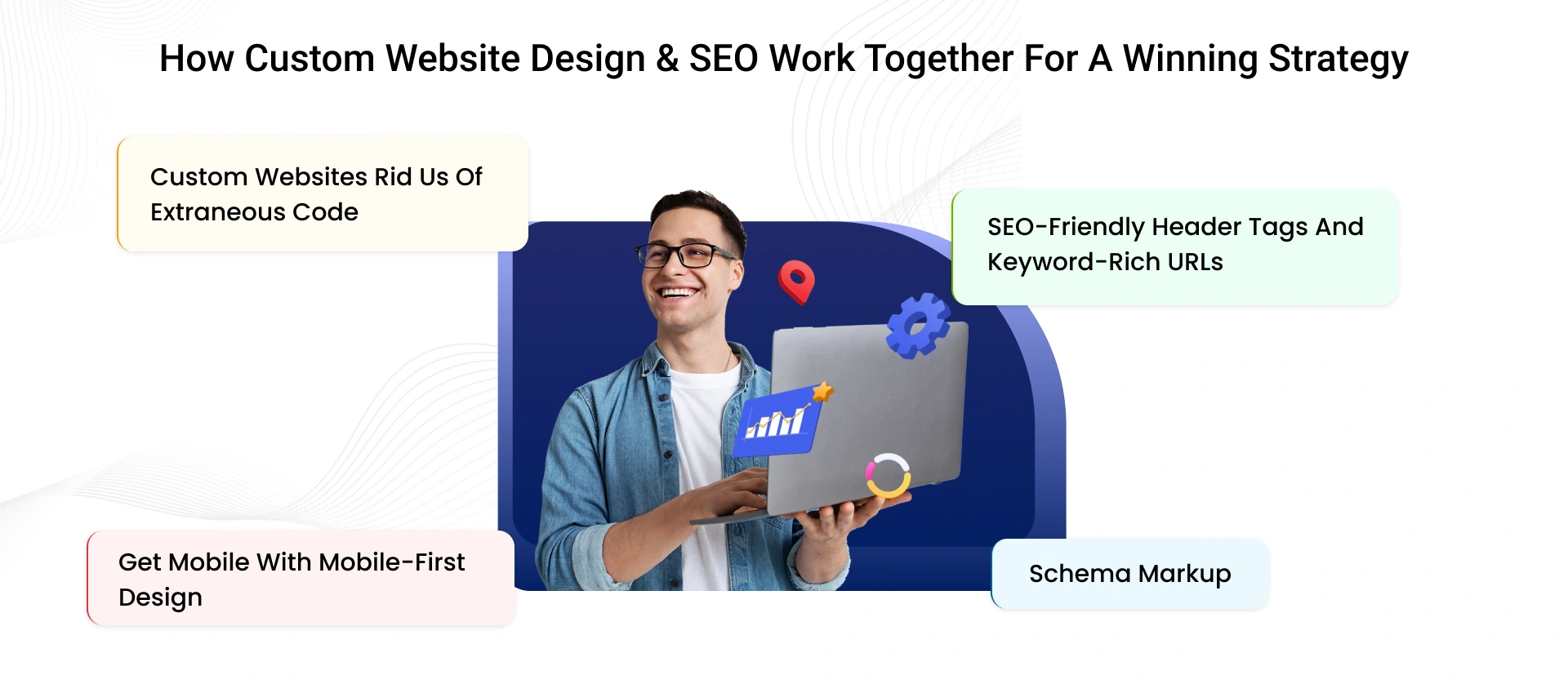
Found in website templates, leading to faster speed and better overall crawling efficiency. Not only do faster load times improve the user experience, but they also help with SEO. Amazon, for instance, constantly works on speed optimization—it can be as little as a few milliseconds that can impact the conversion rate substantially.
Google has already switched to mobile-first indexing, so if you want your site to be indexed correctly, it better be mobile-optimized. Designing custom makes mobile experiences seamless — both for usability and SEO. For example, Airbnb has a mobile-friendly layout on its website, which gives an intuitive user experience on smartphones and tablets, increasing engagement and SEO performance.
A custom website enables the use of header tags strategically while building keyword-rich URLs, which, in turn, helps search engines understand your site’s structure and content.
SEO: Clean URLs Across Relevance Keywords enhance search ranking, whereas structured headers reveal data to users and search engines to navigate content efficiently.
Custom websites simplify the process of adding schema markup, which helps boost your site’s presence in search results with rich snippets. It also helps search engines better understand your content and display it in more engaging formats. The New York Times, for instance, employs schema markup to display article dates, review ratings, and author information directly in search results, enhancing the attractiveness and discoverability of their content.
While content is king in SEO, how it is delivered and structured can have a considerable impact. Content creation, when coupled with a custom design, makes the content more engaging for the users and more discoverable for the search engines.
When you have a custom design, the placement of your content can help guide your users through your website. Logically structuring your content — using headers, subheadings, and calls-to-action can make your website easier to navigate, often leading to more extended visits and more interaction. By carefully considering content placement and design elements, businesses can enhance user experience and improve their search engine rankings. A well-known brand like IKEA demonstrates this perfectly. Their website design is highly visual and intuitive, with clear sections, product categories, and engaging content like how-to guides and inspiration ideas. These elements are strategically placed on the homepage and throughout the site, making it easy for users to explore different categories while keeping them engaged. This structure helps users find exactly what they’re looking for without feeling overwhelmed, resulting in longer browsing sessions and better SEO performance.
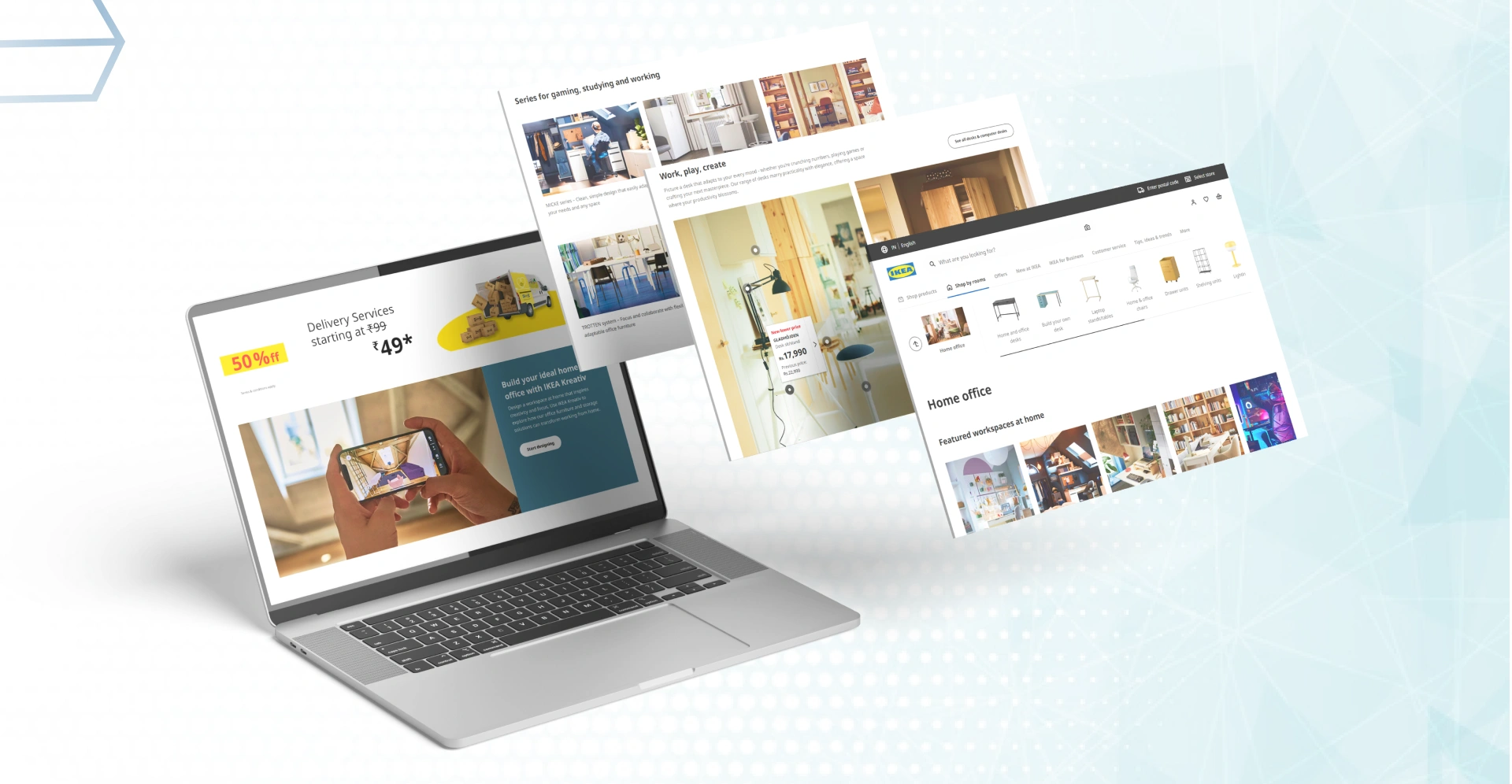
Custom layouts help ensure that content is accessible, visually appealing, and fits the website's design scheme. BuzzFeed employs a highly optimized format that segments long-form content into bite-sized pieces featuring images, GIFs, and other visual pieces. With a custom website, you can borrow similar ways of structuring your site to ensure users interact with it—and stick around longer, positively affecting SEO.
Custom websites are built for long-form content without users feeling overwhelmed. Another way to make your content more readable and engaging is by breaking up text with headers, images, and multimedia.
While the look and feel of your site matter, the advanced features ensure your website drives traffic and converts visitors into customers. Custom websites offer flexibility and scalability, enabling you to implement features that optimize user engagement and conversion rates.

Custom web development allows you to design CTAs (calls-to-action), forms, and navigation in a way that drives conversions. For example, Shopify is widely recognized for its streamlined, user-friendly checkout process, which helps minimize cart abandonment and drive sales. That's why, for a conversion-focused website, you should ensure that users move seamlessly through the sales funnel.
It is pretty easy to integrate structural analytics tools into your custom websites so you can track user behavior and then make data-driven decisions accordingly. Netflix, for instance, leverages user analytics to curate content suggestions and boost user retention. Through custom websites, the analytics part can be used to your advantage further to optimize your website content and design to drive more engagement and conversions.
Users and search engines alike are concerned with security. Custom websites can add more substantial security features, such as SSL encryption, to protect customer data. An example of a brand that prioritizes the security of its website is PayPal, as it wants to build trust among users and have customers make transactions. Your secure site helps earn customers' trust and boosts your SEO rankings.
As your brand evolves, so should your website. An ideal example of a scalable website is Amazon, where millions of visitors surf products. You can create a custom website with new features or functionality as and when required so your site can grow with your business without affecting its performance.
Website performance is a fundamental aspect of digital performance, and Google’s Core Web Vitals have made speed and usability non-negotiable for successful SEO. Templates are increasingly laden with unnecessary code that may bog down your site while custom website design allows you to optimize every aspect for performance. This allows you to build the code you need, ensuring fast load times, minimal layout shifts, and responsive interactions — giving users an experience they will love and search engines will reward.
A custom solution means you can tailor your site to metrics like Largest Contentful Paint (LCP) and Cumulative Layout Shift (CLS) that speak directly to user expectations of speed and stability. Such accurate optimization decreases bounce rates and provides a sense of professionalism and credibility that differentiates your brand from others that still use generic approaches.
We need to be agile in adjusting to the changes brought forth by voice search and how users interact on the internet. Templates often fall short of the flexibility required to adapt to this trend, whereas website designs without templates offer the speed to react to changing user behaviors in real-time. Custom sites make it easier to utilize conversational keywords, create structured content, and utilize the natural language processing measures that voice search platforms favor.
FAQ sections, localized content, or interactive elements can be designed with voice search in mind, allowing your site to reach the expanding niche of visitors who use intelligent assistants (like Alexa or Siri). This proactive strategy keeps your brand in line and brings users wherever they are most convenient while being ahead of competitors still stuck with static, template-based solutions.
A clear internal linking strategy does wonders for user experience and your SEO efforts, but it's challenging to implement this successfully within the parameters of a template. With custom website design, you can create a structure that naturally maps out how users browse and search engines categorize your pages.
This works exceptionally well for content-rich sites since linking logically between the pages of your website enriches your pages and serves visibility and engagement. Rather than restricting you to a template with a set layout, a custom design allows you to include relevant links that aid navigation and encourage visitors to dig deeper into your content and drive better results.
To show up in Google’s featured snippets — primo real estate at the top of search results — takes precision templates that aren’t usually provided. With custom website designs, your content can be organized to make it easier for search engines to determine who is visually impaired, as people using split-screen can easily pick their results with links with subheadings that peak out.
Custom layouts allow you to present your content on brand, helping users find your site and commit it to memory. Such updates help establish your brand’s authority and draw more organic traffic than those bland template-based competitors can muster.
Attracting attention and projecting professionalism requires high-quality visuals, but using unoptimized content can hurt performance. However, many templates use preloaded components that can't easily be customized, which makes them slower. On the other hand, custom website design gives you complete control of formats, sizes, and lazy loading, so your site looks as good as it can be with no loading delays.
Custom websites improve accessibility and search engine indexing, implementing descriptive alt tag data and serving images in newer formats. This functional aesthetic balance ensures that your brand communicates effectively while providing the fast and fluid experience that users expect.
Your brand’s website should be more than functional; it should be transformational. We envision a platform — A platform to grow with you, designed to engage your audience and integrate into your marketing efforts. That is what custom website delivers.
From a start-up that wants to shake up the market to an established brand wanting to improve its online presence, JanBask has the experience to turn your vision into a reality. Our solutions are designed to make your brand shine in a competitive world by building trust through innovative design and delivering measurable results.
Let’s build a memorable digital experience that will resonate with your audience and help you take your business forward. JanBask Digital Design is here for your unlimited possibilities. Get in touch, and let's explore how we can boost your brand like never before!
Still unsure about the investment in your custom website for branding & SEO?

G
Very informative! I liked how it broke down technical stuff like URL structure and schema without sounding too nerdy.